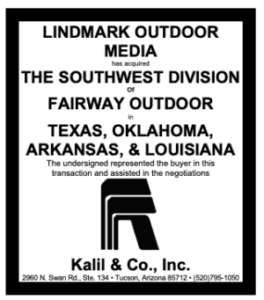
On August 15, 2023, the Arizona Court of Appeals issued an important decision on standing in billboard variance cases. In the case, Arcadia Osborn Neighborhood Association, et al vs Clear Channel Outdoor, Clear Channel was granted by the Phoenix Board of Adjustment five use permits and variances to relocate and convert to digital five billboards on to a building façade in Phoenix, Arizona. Three individuals and their neighborhood association appealed the Board’s decision, claiming it violated the Phoenix Zoning Ordinance. The trial court dismissed the petition of the individuals and neighborhood association due to their lack of standing to challenge the Board’s decision. The appellate court affirmed, holding that the individual plaintiffs “do not have a sufficient particularized palpable injury to confer standing,” and that their neighborhood association “has neither representational nor organization standing.”
The court went on to explain that Arizona law authorizes a “person aggrieved by a decision of the legislative body or board” to file a petition for judicial review of such a decision, as the Plaintiffs did in this case. However, even though it interpreted “person aggrieved” broadly, the court said to have standing to bring such an action “a plaintiff must allege ‘particularized harm’ resulting from the [Board’s] decision.” By contrast, “an allegation of generalized harm that is shared alike by all or a large class of citizens generally is not sufficient to confer standing.” In this case, for example, the individual plaintiffs “assert harms related to traffic safety and loss of aesthetic value in the area,” but the court concluded they “have not alleged particularized harm causing palpable injuries,” so their “allegations are insufficient to confer standing.”
Turning to the neighborhood association of the individual Plaintiffs, the Arcadia Osborn Neighborhood Association (“AONA”), the court first considered the allegations of “representational standing,” under which “given all of the circumstances in the case, the [organization] has a legitimate interest in an actual controversy involving its members and … judicial economy and administration will be promoted by allowing representational appearance.” However, the court rejected any claimed representational standing because the individual “association’s members would not have standing to sue in their own right,” so AONA didn’t either. Second, the court then proceeded to deny AONA’s claim of “direct organizational standing,” because “in Arizona organizations ‘cannot establish standing if the only injury arises from the effect of a challenged action on the organization’s lobbying activities, or when the service impaired is pure issue advocacy.’ “ In this case, for example, AONA’s efforts to limit digital billboard conversions was deemed the type of “pure issue advocacy” that fails to confer the required standing.
Texas and most other States have a statute similar to that of Arizona, giving “a person aggrieved by a decision of the board,” like a variance or special exception granted by a zoning board of adjustment, a right to appeal to the trial court and attempt to prove the decision was “illegal in whole or in part.” The AONA vs Clear Channel case, however, requires that those aggrieved persons must have a “sufficient particularized palpable injury” to establish standing and sustain such an appeal.
To receive a free morning newsletter with each day’s Billboard insider articles email info@billboardinsider.com with the word “Subscribe” in the title. Our newsletter is free and we don’t sell our subscriber list.
Paid Advertisement

















